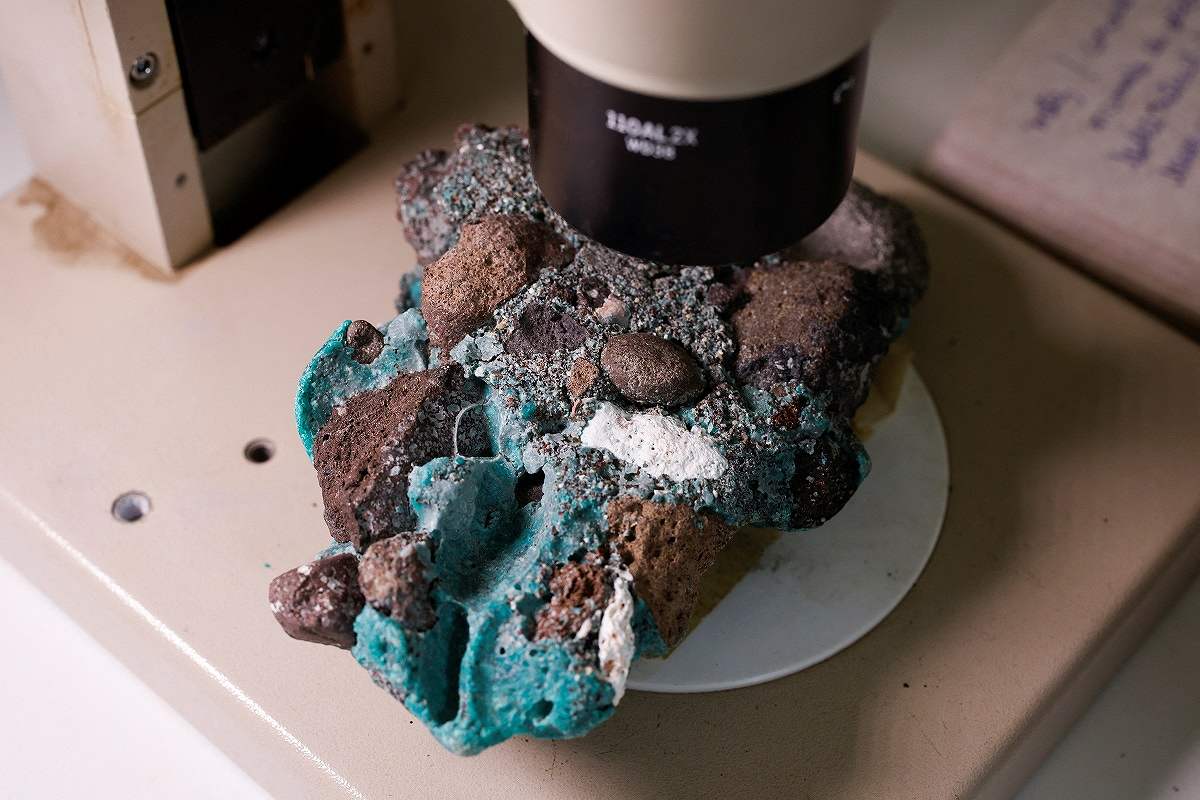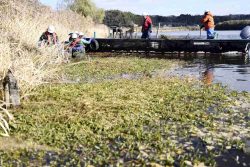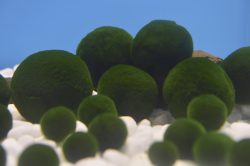
“Plastic rocks” found on Trindade Island in the state of Espirito Santo are seen at the laboratory of the Federal University of Parana, in Curitiba, Brazil on March 7.
12:50 JST, March 24, 2023
TRINDADE ISLAND, Brazil (Reuters) — The geology of Brazil’s volcanic Trindade Island has fascinated scientists for years, but the discovery of rocks made from plastic debris in this remote turtle refuge is sparking alarm.
Melted plastic has become intertwined with rocks on the island, located 1,140 kilometers from the southeastern state of Espirito Santo, which researchers said is evidence of humans’ growing influence over the earth’s geological cycles.
“This is new and terrifying at the same time, because pollution has reached geology,” said Fernanda Avelar Santos, a geologist at the Federal University of Parana.
Santos and her team ran chemical tests to find out what kind of plastics are in the rocks called “plastiglomerates” because they are made of a mixture of sedimentary granules and other debris held together by plastic.

A researcher holds “plastic rocks.”
“We identified [the pollution] mainly comes from fishing nets, which is very common debris on Trinidade Island’s beaches,” Santos said. “The [nets] are dragged by the marine currents and accumulate on the beach. When the temperature rises, this plastic melts and becomes embedded with the beach’s natural material.”
Trindade Island is one of the world’s most important conservation spots for green turtles, or Chelonia mydas, with thousands arriving each year to lay their eggs. The only human inhabitants on Trindade are members of the Brazilian Navy, which maintains a base on the island and protects the nesting turtles.
“The place where we found these samples [of plastic] is a permanently preserved area in Brazil, near the place green turtles lay their eggs,” Santos said.
The discovery stirs questions about humans’ legacy on the earth, said Santos.
“We talk so much about the Anthropocene, and this is it,” Santos said, referring to a proposed geological epoch defined by humans’ impact on the planet’s geology and ecosystems.
“The pollution, the garbage in the sea and the plastic dumped incorrectly in the oceans is becoming geological material … preserved in the earth’s geological records.”
Top Articles in Science & Nature
-

iPS Treatments Pass Key Milestone, but Broader Applications Far from Guaranteed
-

Record 700 Startups to Gather at SusHi Tech Tokyo in April; Event Will Center on Themes Like Artificial Intelligence and Robotics
-

iPS Cell Products for Parkinson’s, Heart Disease OK’d for Commercialization by Japan Health Ministry Panel
-

Japan to Ban Use of Power Banks on Airplanes
-

Kairos Rocket Launch Postponed
JN ACCESS RANKING
-

Producer Behind Pop Group XG Arrested for Cocaine Possession
-

Japan PM Takaichi’s Cabinet Resigns en Masse
-

Man Infected with Measles Reportedly Dined at Restaurant in Tokyo Station
-

Israeli Ambassador to Japan Speaks about Japan’s Role in the Reconstruction of Gaza
-

Videos Plagiarized, Reposted with False Subtitles Claiming ‘Ryukyu Belongs to China’; Anti-China False Information Also Posted in Japan























